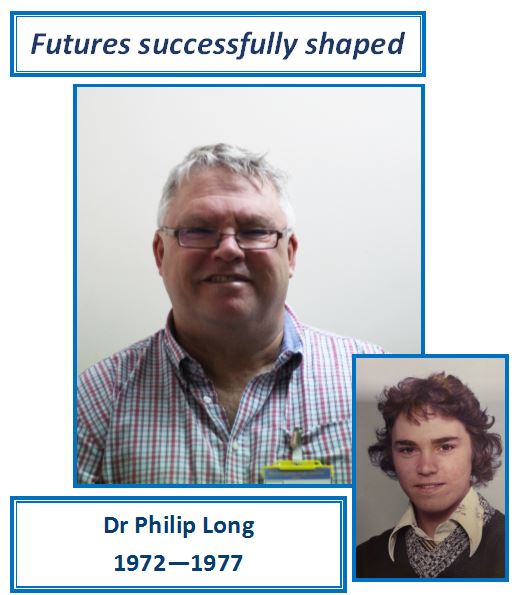Alumni - Philip Long
Philip Long
I remember quite clearly my first day at Manningtree school. It seemed huge compared to the primary school I had attended and smelt of fresh paint. The school was, despite my initial impression, quite small in terms of the numbers of pupils, and there were, I think, only about 100 pupils in each year, giving a total of about 500 in the whole school. There were teachers who we all liked and there were some we all feared.
Probably the best school activity I ever took part in was when the 4th year (Y10) boys went to an outdoor pursuits centre in the Brecon Beacons in South Wales. It was the middle of January and the first time most of us had been away from home and we had an absolute ball, despite it being freezing cold and us having to do the cooking and preparing of our own packed lunches.
There was a clear focus on vocational skills, metalwork, woodwork, technical drawing (TD), car mechanics and for the girls, there was needlework and home economics, and there may have been typing, but I can’t be sure. Sports were quite a big thing at school. The idea of the Secondary Modern school system was then to prepare pupils for low skill or semi-skilled jobs which is what most of my peers ended up doing, getting an apprenticeship marked you out as something a bit special.
I left school in June and started my apprenticeship in August 1977 with Cadmans as a bricklayer. I had been offered an apprenticeship at the Colchester Lathe Company, but I chose bricklaying over engineering, because I thought it would be nice to work outside in the sun, and my eldest brother was a bricklayer with Roses in Mistley. At the time there were plenty of jobs, both skilled and especially unskilled, and so there was a much greater focus on preparing us for the world of work.
I didn’t enjoy my apprenticeship and quickly realised that I should have taken more notice of my teachers who were, as usual, right. It took me 3 years to complete my apprenticeship but when I did finish I walked away from the construction industry and returned to full time education, taking and passing 5 O levels at the Colchester Institute. I then took and passed 3 A levels and after a year of thinking about my future, I went to University to take a degree in history and English, my two best subject from Manningtree school. After my degree I then took up a teaching qualification, not to teach in schools, but further education, picked up a couple of Masters degrees and then, finally, my Doctorate.
Academically I have achieved a great deal but on the way I also learnt one really important lesson, and that is that the person with the academic qualifications is always in a better position than the one without them, because they can make choices for themselves, the ones without qualifications tend to end up with whatever is left over and tend to have the choices made for them.
Life skills that I gained at Manningtree school were toughness, resilience and self-reliance: they are, I am sure, not what the school motto had in mind, but I think they stood us in good stead.
My most memorable moment has been the hardest section to write. One I can share is when we were in the 5th year (Y11) and as part of an extra curriculum activity, we were taken to Ardleigh reservoir where I learned to sail a mirror dingy. Although it must have been in the Spring term, the water was still freezing, but the sense of freedom flying across the water with the wind in the sails was one which will, I think, stay with me forever.
Philip visited Manningtree school in 2017, not having been back since 1977!




